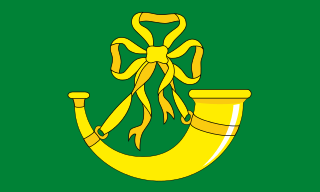
Huntingdonshire is a non-metropolitan district of Cambridgeshire and a historic county of England. The district council is based in Huntingdon. Other towns include St Ives, Godmanchester, St Neots and Ramsey. The population was 169,508 at the 2011 Census.

Ramsey Abbey was a Benedictine abbey in Ramsey, Huntingdonshire, England. It was founded about AD 969 and dissolved on 22 November 1539.

Ramsey is a market town and civil parish in Cambridgeshire, England. The town is about 9 miles (14 km) north of Huntingdon in the non-metropolitan district and historic county of Huntingdonshire. Ramsey parish includes the settlements of Ramsey Forty Foot, Ramsey Heights, Ramsey Mereside, Ramsey Hollow and Ramsey St Mary's.
William Mitchell may refer to:
Baron de Ramsey, of Ramsey Abbey in the County of Huntingdon, is a title in the Peerage of the United Kingdom. It was created in 1887 for Edward Fellowes, who had previously represented Huntingdonshire in the House of Commons as a Conservative for 43 years. His eldest son, the second Baron, sat as Member of Parliament for Huntingdonshire and Ramsey and later served as a Lord-in-waiting from 1890 to 1892 in the Conservative administration of Lord Salisbury. His grandson, the third Baron, was Lord Lieutenant of Huntingdonshire from 1947 to 1965 and of Huntingdon and Peterborough between 1965 and 1968. As of 2017 the title is held by the latter's son, the fourth Baron, who succeeded in 1993.

Huntingdon is a constituency west of Cambridge in Cambridgeshire and including its namesake town of Huntingdon. It has been represented in the House of Commons of the UK Parliament since 2001 by Jonathan Djanogly of the Conservative Party.
Huntingdonshire was a Parliamentary constituency covering the county of Huntingdonshire in England. It was represented in the House of Commons of England until 1707, then in the House of Commons of Great Britain from 1707 to 1800, and then in the House of Commons the Parliament of the United Kingdom from 1801 to 1885. It returned two Knights of the Shire ; when elections were contested, the bloc vote system was used.
Frederick Hall or Fred Hall may refer to:
Edward Fellowes, 1st Baron de Ramsey DL was a British Conservative Member of Parliament.
William Henry Fellowes, 2nd Baron de Ramsey, was a British Conservative politician.
William Henry Fellowes, of Ramsey Abbey in Huntingdonshire and Haverland Hall in Norfolk, was a British Member of Parliament.
Ramsey was a parliamentary constituency in Huntingdonshire, which elected one Member of Parliament (MP) to the House of Commons of the Parliament of the United Kingdom. It was also known as North Huntingdonshire.
Richard Benyon De Beauvoir (1769–1854) MP was a 19th-century British landowner, philanthropist and High Sheriff of Berkshire.
Richard Fellowes Benyon, born Richard Fellowes, was a British Conservative politician and civil servant.
William Montagu may refer to:
John Heathcote FRS was a British Member of Parliament.
Henry Cromwell-Williams of Bodsey House, Huntingdonshire was an English politician who sat in the House of Commons variously between 1654 and 1673.
John Ailwyn Fellowes, 4th Baron de Ramsey is a British landowner, agriculturalist, and the first chairman of the Environment Agency.
George Walton (1749–1804) was an American politician who signed the United States Declaration of Independence.
William Fellowes (c.1726–1804) was an English politician.
This page is based on this
Wikipedia article Text is available under the
CC BY-SA 4.0 license; additional terms may apply.
Images, videos and audio are available under their respective licenses.



